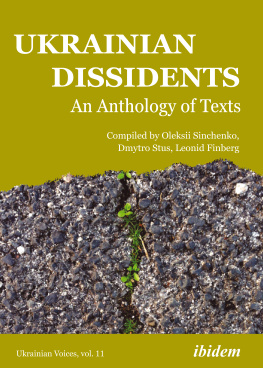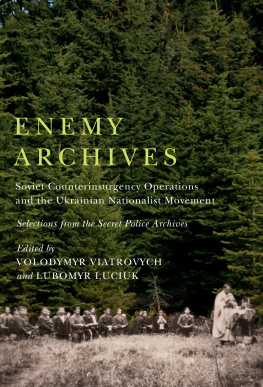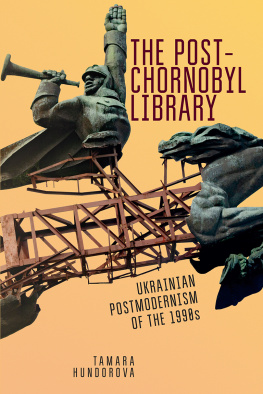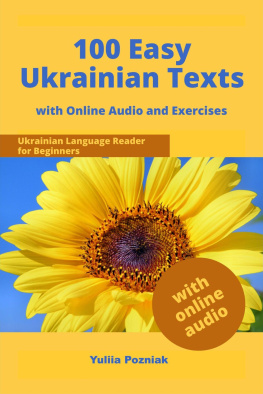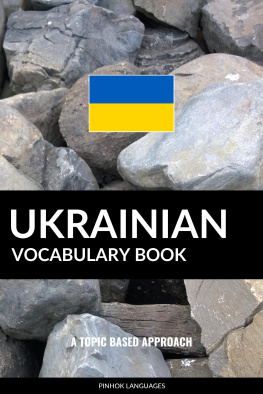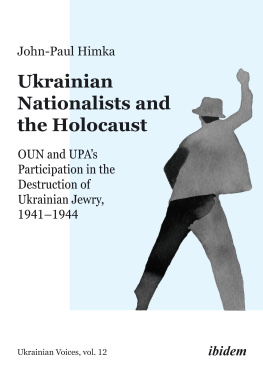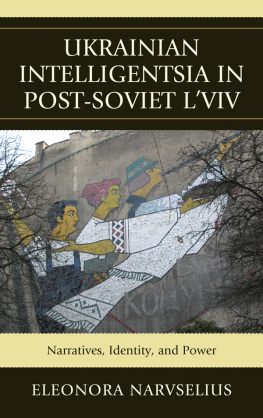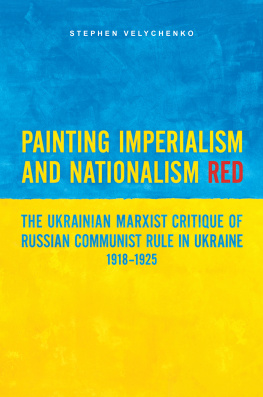Contents
ibidem -Press, Stuttgart
Preface
The Dissident Movement in Texts
This book is about a generation that has created its own history, daring to challenge official ideology and culture. Its leaders did not have access to high tribunes, their texts were printed mainly in samvydav (self-publishing free of state censorship), and works of art were often simply destroyed, such as the stained-glass window Shevchenko. Mother in the red building of Kyiv University. Its leaders were later arrested and even physically killed.
Each generation needs to rediscover and, consequently, rethink the most important pages of the history of their country in order to better understand the involvement in tradition and understand the motives that guided the actions of those individuals who created (successfully or notanother question) the country in which they had to live.
The greater the understanding of such motives, the stronger our involvement in the important processes of building a democratic state, in the name of which so much blood and sweat has been shed, nerve cells and human destinies burned, examples of great deeds and great betrayals. Well, otherwise, it probably does not happen. The progress of each generation is a path, and on the way, especially when you have to pave it, you will not meet paved roads. As Les Tanyuk, one of the members of the dissident movement, repeated, there will be no wind, we must row with our hands.
The phenomenon of the dissident movement of the 1960s and 1980s affects our society by the very fact of its existence. In history, of course, this is not the first and probably not the last case when recent history, due to lack of actualization, is shrouded in ignorance, but we can still renew the motivational picture of this generation, which was based on great truthfulness and devotion to humanistic ideals in some places it pushed the elect to actions that from the point of view of common sense and wisdom of life may seem absurd. They, dissidents, sought refuge from the same troubles and problems as we do todaymeanness, corruption, lies, social stagnation and hopelessness, only in much harsher conditions of authoritarian rule. They were looking for ways to overcome fear and uncertainty, so they often resorted to desperate and not always balanced thoughts and steps, which nevertheless shaped the era and allowed us to reach the right to announce to the world in 1991: we have succeeded in our own voice and we have courage to build our own state.
Not everything is going well for us. But despite our many mistakes and failures, we are making our way. And precisely because the ideas of state independence, as well as human dignity and decency were established in the public consciousness largely thanks to dissidents, it seemed relevant and important to present to today's reader an anthology of texts of the Ukrainian resistance movement.
In the selection of texts we were guided by the need to present this movement not just at the level of socio-political issues, but at the level of specific human destinies, to form an emotional picture of the history of ideasin their lively pulsation, not burdened by further reception, sometimes reaching apologetics or myth-making; at the level of self-evident texts.
This led to the choice of structure: from poetry to post-trial comprehension, then to texts about prisons and camps, and finally to rethinking ones own experience of opposing the totalitarian system.
The anthology opens with a section on poetry, prisoner poetry. Such poetry often appeared in indictments and was banned, and its authors were given long prison terms. Some of them, like V. Symonenko, remained in their time the harbingers of the generation that described themselves as prisoners of conscience.
The public speeches and statements represented in Chapter 2 symbolized the growth of civic responsibility, because no public manifestation escaped the sleepy eye of the KGB. The brave were arrested, fired or forced to repent. Public opposition increasingly took the form of underground opposition, as exemplified by samvydav. Chapter 3 presents the pearls of self-published essays, which embrace the widest range of issues, reflect the pulsation of time and convey the unique style of their authors.
In other separate sections present the so-called last words of the defendants in the-then closed trials, as well as evidence of the conditions of detention in camps, in exile, and psychiatric hospitals, which will allow the modern reader to recreate the necessary contexts to understand the circumstances in which prisoners of conscience defended their right to be human.
To make the picture more complete, we supplemented it with the first interviews recorded by Western correspondents with Raisa Moroz and Nadiya Svitlychna when they managed to emigrate from the USSR, as well as essays published there (i.e. published abroad), an important mechanism for conveying truthful evidence from behind the Iron curtain.
The section Rethinking is self-reflective. This is an analysis of the dissident movement experienced directly by the participants.
The compilers did not set out to present all the important texts of the dissident movement. Achieving this goal would involve the publication of an entire multi-volume series. We are aware that many works have been left out of this anthology, but we hope that the book will help the modern Western reader to feel the nerve of the era, to better understand why such different people as Ivan Svitlychny and Vyacheslav Chornovil, Semyon Gluzman and Vasyl Stus, Ihor Kalinets and Nadiya Svitlychna could not be silent... And why they associated freedom with camps and not with life in freedom.
Offering this book to our foreign readers, we hope that they will read with interest these pages of the history of Ukraine in the second half of the twentieth century. The extraordinary spiritual feat of Ukrainian dissidents deserves to be understood as a contribution to the struggle and freedom not only of Ukraine but also of other nations of the world.
Oleksii Sinchenko, Dmytro Stus and Leonid Finberg
Translated by Olga Furman
.
Poetry
Ihor lnts
Stained-Glass Windows
Millions of suns
set in a honeycomb
from squares, segments and trapezoids
fell from fissures of arches.
A million suns
from joyfully fiery ones,
to yellow and red-hot ones,
to mild ones,
to pale blue ones,
to the tender translucence of half-tones.
And in the synthesis of the mosaic of their colors
and lines light and majestic
I recognized,
I took into myself
saints from the brightness of their face.
From that as if I were glass
I was strewn through a translucent and colorful
abundant infinite number
of small and bright flashes
onto the church in St. Olhas hand,
on St. Volodymyrs finger,
on the books of wisdom of the monks
of green-hilled Pechersk Monastery.
And I was already blazing like a gem,
in Danylos crown,
on Nalyvaikos face
I coagulated in a blood clot.
I was to all for everyone and entirely:
grandeur, faith and pain...
I stepped out of the church
and began to shine
in a millennial halo.
Translated by Michael M. Naydan
Green
Rains with whispering lips
Kiss the green earth.
I kissed your green eyes this way
When you were coming back from the woods,
Dew-covered with a soft commotion
Your voice floated along me
Like wind along the grass.

